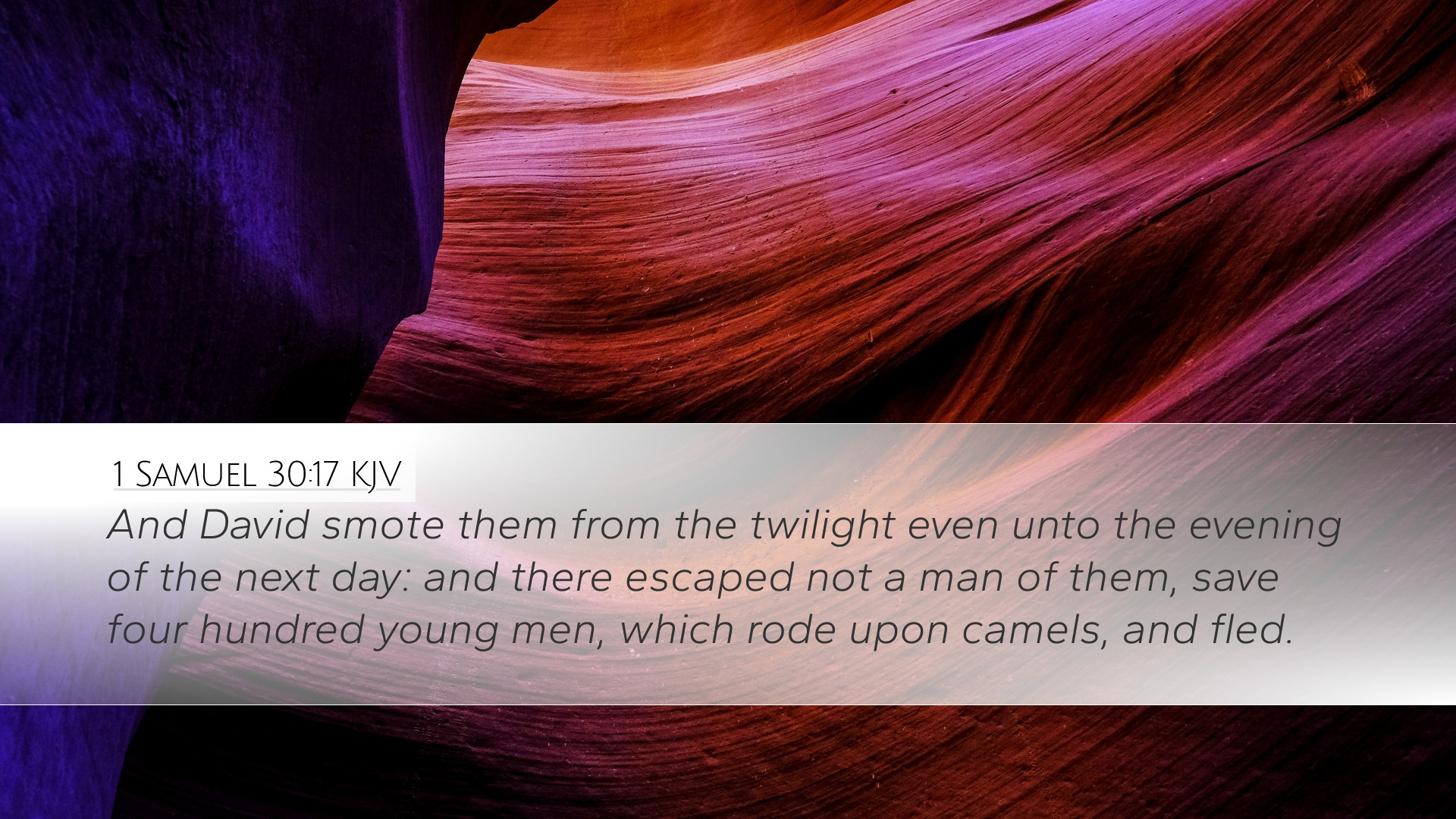Commentary on 1 Samuel 30:17
1 Samuel 30:17 provides a vivid narrative moment where David, after returning to find his city of Ziklag devastated and his people taken captive, engages in a fierce battle against the Amalekites. The verse particularly emphasizes David's decisive act as he pursues and overcomes his enemy, demonstrating profound themes of leadership, divine providence, and the restoration of hope.
Contextual Analysis
This incident occurs during a tumultuous period in David's life, characterized by his struggle against King Saul and his subsequent retreat to the Philistine territory. The capture of Ziklag by the Amalekites serves as a pivotal moment, reinforcing themes of loyalty, community, and divine intervention. David’s response reveals his role not just as a fugitive but as a leader capable of rallying his men in the face of despair.
David's Leadership in Crisis
David exemplifies extraordinary leadership qualities at a critical juncture. Once he learns of the Amalekite raid, he directs his distressed men towards action rather than despair, highlighting several key aspects of effective leadership:
-
Promptness:
David does not linger in sorrow but immediately mobilizes his forces, thus demonstrating the necessity of timely action in leadership.
-
Inspiration:
By rallying his men who are initially distressed, David provides a beacon of hope that inspires them to recover their loved ones. This act of motivating his troops reflects the significance of encouragement within a community facing adversity.
-
Trust in Divine Guidance:
David seeks God’s counsel before engaging in the battle (1 Samuel 30:8), showcasing the importance of spiritual discernment in moments of crisis.
Divine Providence in the Narrative
Albert Barnes emphasizes the theological implications of God's providence intertwined in this narrative. David’s victory over the Amalekites is a testament to the fulfillment of God’s promises to protect and lead His appointed leaders. It serves as a reflection of God’s faithfulness even amidst human failure and uncertainty.
Theological Reflections
The act of pursuing the Amalekites and reclaiming what was lost symbolizes a broader theological assertion: the restoration that God offers. Adam Clarke notes that not only is David reclaiming his possessions, but he is also restoring the dignity and emotional well-being of his men and their families. This act is prophetic of God’s larger redemptive plan throughout scripture.
The Nature of the Battle
In the description of the battle, we see David engaging the Amalekites from dawn until the evening of the next day. Matthew Henry’s commentary highlights the relentless nature of this pursuit, which can be interpreted as a metaphor for the perseverance required in spiritual struggles. The physical battle becomes emblematic of the spiritual warfare faced by believers.
-
Persistence:
The duration of the battle illustrates the significance of persistence and steadfastness in the face of overwhelming odds.
-
Victory through Divine Help:
David’s success is attributable to God’s favor. The idea that God fights alongside those who earnestly seek Him is a recurring theme throughout scripture.
Victory and Restoration
As the narrative unfolds, we note the comprehensive victory that David achieves. Not only do they defeat the Amalekites, but they reclaim everything that was taken from them. This act of reclaiming is deeply significant in the life of a believer. Clarke notes that the recovery of David’s wives and those of his men symbolizes the restoration of relationship and belonging which can be seen as a profound spiritual truth in the Christian experience.
Application for Pastors and Theologians
This passage presents multiple layers of application for pastors, students, and theologians. The insights drawn from the narrative can inform preaching, teaching, and personal reflection in several significant ways:
-
Leadership and Counseling:
Effective leadership requires not only initial decisive actions but also the sustained encouragement of others, drawing parallels between David’s actions and the role of church leaders and counselors today.
-
Facing Adversity:
The narrative encourages believers to confront their struggles, reminding them of God’s promises and the importance of persistence in pursuing healing and restoration.
-
Spiritual Warfare:
The battle against the Amalekites serves as a reminder of the unseen battles faced in the spiritual realm, urging believers to remain vigilant and prayerful.
Conclusion
1 Samuel 30:17 serves as a profound source of insight regarding leadership, faith, and the assurance of victory through God. The comprehensive nature of David's victory reminds us of the redemptive nature of our God, who assures us that restoration is always possible. As we reflect on this passage, may we find encouragement to lead, to fight for our loved ones, and to pursue the restoration that God offers for our lives.


